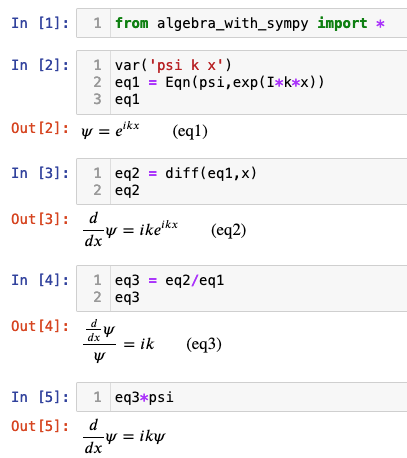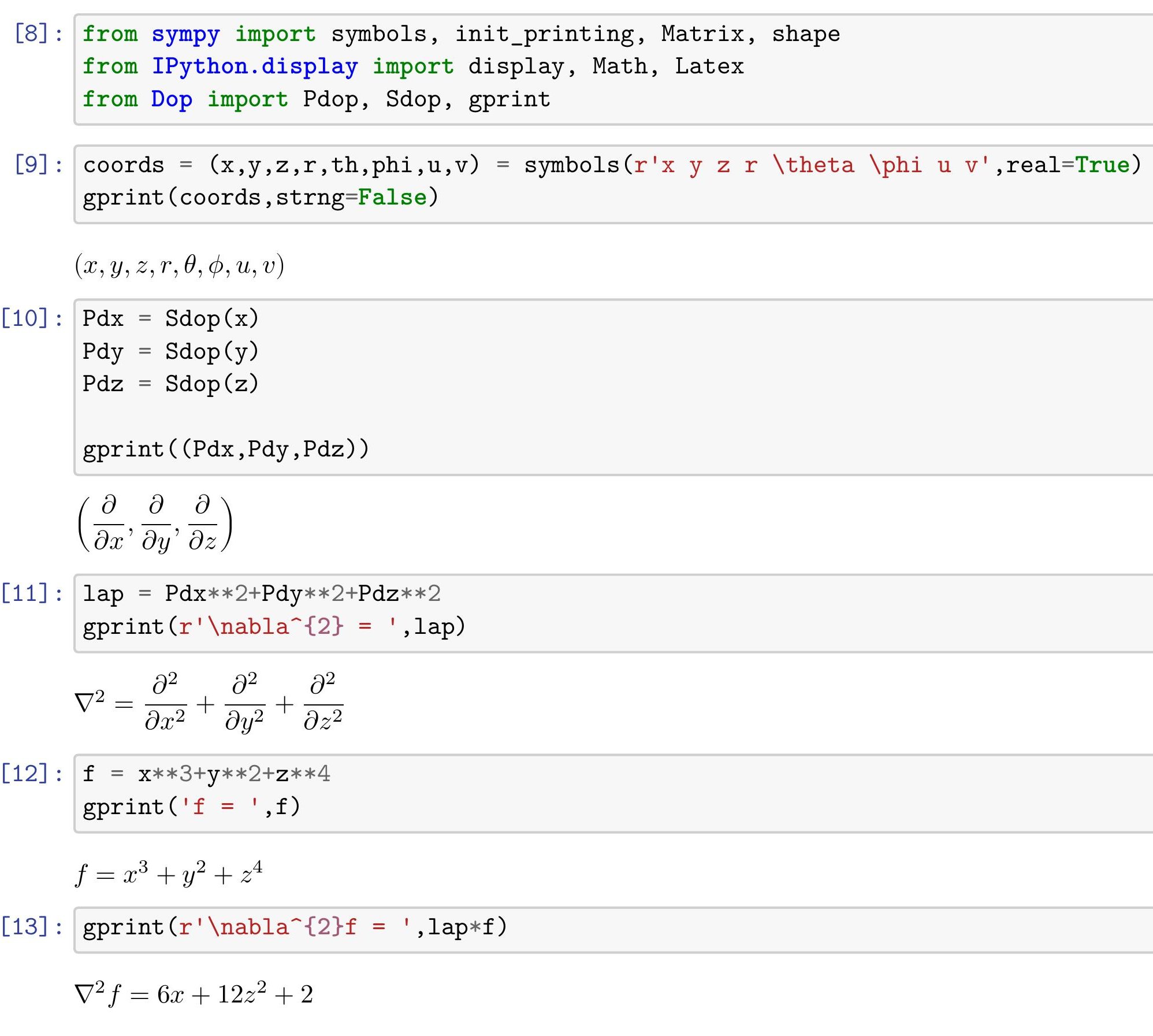Keeping expressions short and concise
Andre Bolle
gu...@uwosh.edu
>>> algwsym_config.output.human_text=True
>>> var('psi k x')
(psi, k, x)
>>> eq1=Eqn(psi, exp(I*k*x))
>>> eq1
psi = exp(I*k*x)
>>> eq2 =diff(eq1,x)
>>> eq2
Derivative(psi, x) = I*k*exp(I*k*x)
>>> eq2.subs({exp(I*k*x):psi})
gu...@uwosh.edu

Andre Bolle
Consider using the `--user` option or check the permissions.
Andre Bolle
Alan Bromborsky
I am working on a linear differential operator class for sympy (Dop.py). Here is a Jupyter notebook with a simple example -

--
You received this message because you are subscribed to the Google Groups "sympy" group.
To unsubscribe from this group and stop receiving emails from it, send an email to sympy+un...@googlegroups.com.
To view this discussion on the web visit https://groups.google.com/d/msgid/sympy/3ad5c732-248a-4e56-9b1b-c195b1c13435n%40googlegroups.com.
gu...@uwosh.edu
>Consider using the `--user` option or check the permissions.
Jonathan Gutow
On Apr 19, 2022, at 10:24 AM, Alan Bromborsky <abrom...@gmail.com> wrote:
CAUTION: This email originated from outside of the organization. Do not click links or open attachments unless you recognize the sender and know the content is safe.
I am working on a linear differential operator class for sympy (Dop.py). Here is a Jupyter notebook with a simple example -
<sdop_test.jpg>
Alan Bromborsky
Look at -
https://galgebra.readthedocs.io/en/latest/
gradient (geometric derivative) and associated operators implemented with the same interface. Nothing to do with integration implemented. Attached is the code for Dop.py and the test code in Jupyter notebook. The problem with the differential operator class is that in order to use them to stuff a sympy Matrix they have to be sympy expressions and I don't know if that is possible without changing some of the sympy core. You might want to look at geometric calculus -
https://en.wikipedia.org/wiki/Geometric_calculus
galgebra includes all of the differential geometric calculus.
Could you give me examples of what you want to do in pdf/latex
format files. Essentially all that Dop.py does is provide a
different api to using sympy derivatives. If all is required is
changing the api that would not be too difficult. A integrator
class could be written with a more natural api. What would be
difficult is if you had an integrand with unevaluated differential
expressions. I don't think sympy can return f for the integral of
(df/dx)dx without first differentiating and then integrating.
--
You received this message because you are subscribed to the Google Groups "sympy" group.
To unsubscribe from this group and stop receiving emails from it, send an email to sympy+un...@googlegroups.com.
To view this discussion on the web visit https://groups.google.com/d/msgid/sympy/7C0243F5-5603-4DBF-806D-BC2C51507E86%40uwosh.edu.
Jonathan Gutow
On Apr 19, 2022, at 12:20 PM, Alan Bromborsky <abrom...@gmail.com> wrote:
I don't think sympy can return f for the integral of (df/dx)dx without first differentiating and then integrating.
Alan Bromborsky
Since I have no rant control I proselytize the following graphics
software (free) for generating publication quality graphics
whenever I have a likely target -
https://galgebra.readthedocs.io/en/latest/
look at the "3D Graphs" and "WebGL" galleries. I especially like this one (you can zoom, rotate, and translate it interactively) -
--
You received this message because you are subscribed to the Google Groups "sympy" group.
To unsubscribe from this group and stop receiving emails from it, send an email to sympy+un...@googlegroups.com.
To view this discussion on the web visit https://groups.google.com/d/msgid/sympy/C3F3650B-8F47-4DEF-AE9C-6487168FCBB8%40uwosh.edu.
Alan Bromborsky
This might be relevant -
If you find anything of interest in the link you should check it
out with someone in the math department. The limit to my
knowledge of differential forms is that dx is an element in the
dual space. If we are in (x,y,z) space then dx is a linear
mapping from (x,y,z) to the reals and dx(x,y,z) = x, dy(x,y,z) =
y, and dz(x,y,z) = z.
--
You received this message because you are subscribed to the Google Groups "sympy" group.
To unsubscribe from this group and stop receiving emails from it, send an email to sympy+un...@googlegroups.com.
To view this discussion on the web visit https://groups.google.com/d/msgid/sympy/7C0243F5-5603-4DBF-806D-BC2C51507E86%40uwosh.edu.
Alan Bromborsky
I have attached a paper that also might be relevant. A rigorous
derivation of the thermodynamic equations in terms of differential
forms. Unless you are familiar with differential forms (again I
am not) will require consulting with a real mathematician.
--
You received this message because you are subscribed to the Google Groups "sympy" group.
To unsubscribe from this group and stop receiving emails from it, send an email to sympy+un...@googlegroups.com.
To view this discussion on the web visit https://groups.google.com/d/msgid/sympy/7C0243F5-5603-4DBF-806D-BC2C51507E86%40uwosh.edu.
Andre Bolle
Jonathan Gutow
On Apr 19, 2022, at 10:48 PM, Andre Bolle <andre...@gmail.com> wrote:
Here's what I did. You will notice that the second derivative couldn't see the 'x', which had been replaced by psi.
I do like the equation annotation. (eq1), (eq2), (eq3), etc. Nice.
Chris Smith
Aaron Meurer
>
>
> On Apr 19, 2022, at 10:48 PM, Andre Bolle <andre...@gmail.com> wrote:
>
> Here's what I did. You will notice that the second derivative couldn't see the 'x', which had been replaced by psi.
>
> Yes, that is a “feature” of sympy, which assumes that all symbols that do not have an explicit dependence on the variable of differentiation are constants. Most of the time that works well. You can get around that by specifying that psi is a function of x. See the sympy documentation on functions. I have been fiddling with how to make it take more general derivatives, but need to figure out a definition of an infinitesimal that will function consistently within the sympy environment.
differentiation methods to make it work correctly with derivatives
(the docs for this aren't great right now, but I hope to improve that
soon).
Aaron Meurer
Aaron Meurer
>
>
> I do like the equation annotation. (eq1), (eq2), (eq3), etc. Nice.
>
> Glad you like it. I sometimes collapse the code blocks. This then leaves you with the results of each step as might be provided in a traditional derivation. You can also pretty it up with comments in markdown cells between the each step.
>
> Jonathan
>
> You received this message because you are subscribed to the Google Groups "sympy" group.
> To unsubscribe from this group and stop receiving emails from it, send an email to sympy+un...@googlegroups.com.
